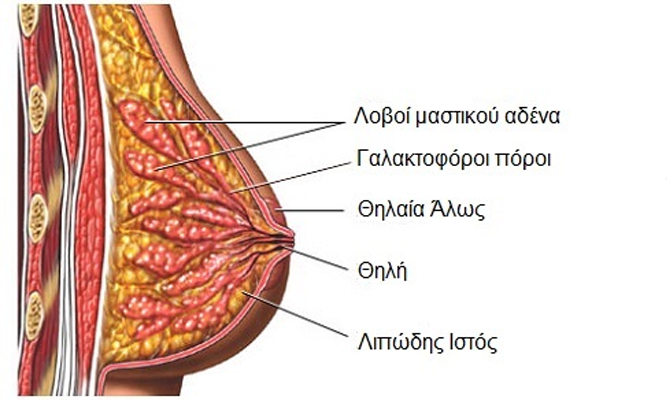Breastfeeding, benefits and potential problems

A newborn is fed exclusively with milk. Breastfeeding is a decision made exclusively by the mother. Certainly, breast milk is also the most ideal food for a newborn, however this should not pressure any mother if she does not feel ready to breastfeed. However, what you should know is that the benefits of breastfeeding are many, both for the baby and the mother.
Below we will analyze the most basic of the advantages, as well as possible problems that may arise from the breastfeeding process. Our goal is to provide a more detailed picture to every new mother who faces the dilemma of breastfeeding or bottle feeding.
The benefits of breastfeeding
One of the main benefits of breastfeeding is the ready antibodies provided to the baby. In particular, during the first period when the baby's immune system is not fully developed, breastfeeding provides the newborn with all the antibodies it needs.
In addition, breastfed babies have fewer respiratory infections, ear infections, and digestive system disorders. Milk enzymes make digestion and absorption of nutrients easier. Of course the benefits don't stop there.
More benefits of breastfeeding
As we mentioned above, the benefits of breastfeeding are huge for both the mother and the child. Apart from antibodies and prevention of various diseases, some of the benefits are:
- Digestion of breast milk and absorption of nutrients becomes easier.
- It is always at the right temperature, saving you the preparation time that ready milk requires.
- Prevents obesity.
- It has a much lower chance of developing an allergy.
- It is the most ideal food for babies.
- It is germ free.
- The ready-made antibodies of the mother's milk are transferred to the newborn.
- It reduces the occurrence of infections in newborns.
- Benefits of breastfeeding for the mother
- It requires no preparation.
- It's free.
- It restores the uterus to its normal size.
- It reduces the chance of breast cancer.
- It brings you closer to your child.
So if you decide to take advantage of all the above advantages and breastfeed your baby, it would be a good idea to take a look at the "Breast and nipple care pads" product category.
Problems arising from breastfeeding
Breastfeeding is a rather difficult process that requires time and a lot of patience. In fact, although the problems that arise from breastfeeding are easy to deal with, they are still a deterrent for many women. For example, you may have difficulties breastfeeding if your baby is very premature, and thus does not have sufficient nipples and swallowing abilities, so breastfeeding is difficult or impossible.
Also, some mothers have inverted nipples, so the baby cannot take the breast. Most of the time, however, this problem can be overcome with instructions from your doctor or the nurse responsible for breastfeeding. Some of the problems presented to some mothers during the breastfeeding process are:
Mastitis

Because of the irritated nipples, the entry of germs can lead to mastitis. It is essentially an inflammation of the breast which is manifested by an increase in heat, redness and general discomfort. It can even be accompanied by fever and general flu-like symptoms. In addition, mastitis can also occur when there is an overproduction of milk but the udders are not emptied regularly (prolonged lactation). A mastitis is treated with appropriate medication (antibiotics and anti-inflammatories) as well as emptying the breasts of the milk that has accumulated. Also recommended is rest and massage of the breast, especially in the affected area, and warm shirts before nursing to encourage flow. .
Spawning
Initially, the breasts produce colostrum in a small amount. Then the amount of milk increases significantly. Two to six days after giving birth, many women feel that their breasts are growing, becoming heavier, warmer and more sensitive. A completely normal condition which is due to the production process of mother's milk and is the normal spawning.
If the baby does not breastfeed enough or in general the amount he receives is small, then it can lead to severe swelling in the breast area, and severe pain in the nipples. Also the loose attachment of the infant to the nipple can block the milk glands, which later lead to engorgement. The breast may be tender in one particular area and red in another. If the problem persists, or the feeling of intense fullness or pain occurs after the first 7-10 days, this is pathological engorgement, caused by incorrect relief of the chest.
Changing the nursing position can help, as can massaging the affected area before and sometimes during nursing. Frequent breastfeeding will ensure a continuous flow of milk but be sure by a specialist that the attachment to the nipple is correct. If the milk is not pumped, it will remain in the breast and 'chemical signals' will be released which will reduce milk production. Prolonged calving leads to reduced milk supply and possibly mastitis.
Injured nipples
Sore nipples are one of the main reasons many mothers decide to give up breastfeeding. In the majority of cases, this situation is due to incorrect breastfeeding practices. The best prevention is the correct procedure of breastfeeding, in which the maternity ward or your pediatrician can help you. Irritated nipples are usually treated with topical creams and ointments.
- 185 Pelopida, Peristeri 12137 Athens
- 2105738672
- Mon - Fri 08:30-14:30 & 17:30 - 20:30
Sat 10:00 - 14:30 - info@pharmacy4cure.gr
- Contact form
- Open on map

